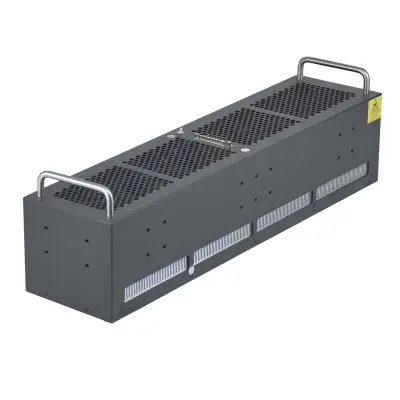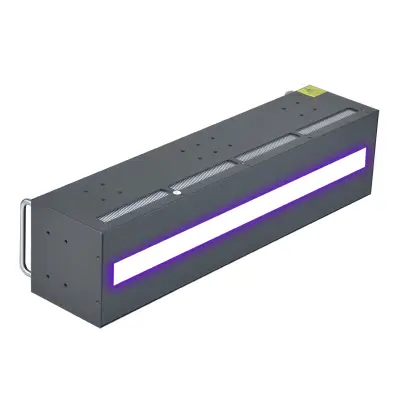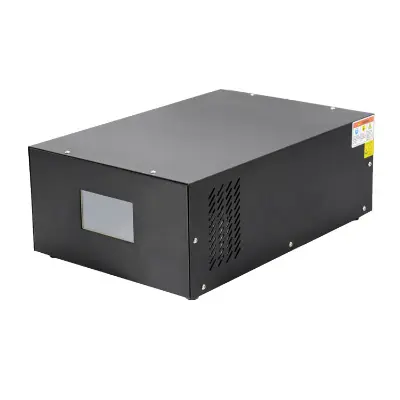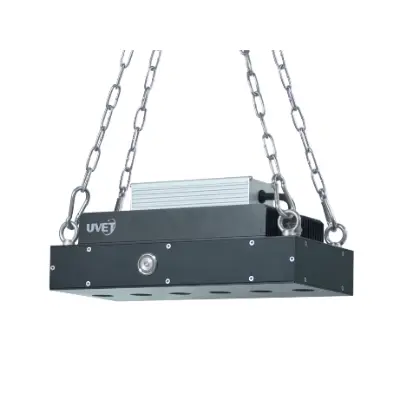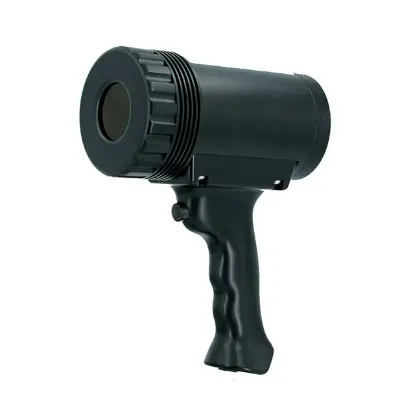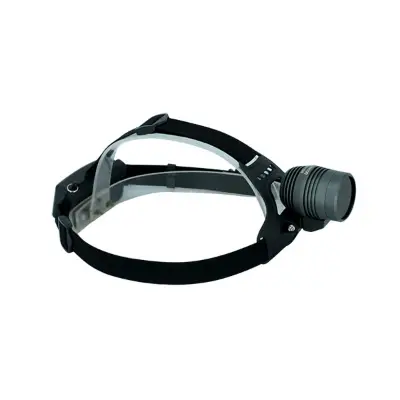LED UV Curing Lamp for Screen Printing
- Model: UVSN-600P4
- Various Sizes
UVET’s LED UV Curing Lamp for Screen Printing from the 500×20mm series delivers powerful UV intensity of up to 16W/cm², ensuring rapid and efficient curing across large surfaces. With optional wavelengths of 365nm, 385nm, 395nm, and 405nm, it supports a wide range of UV inks and materials. Designed for use in various UV printing systems, this LED UV curing lamp offers fast, energy-saving, and reliable performance.
Specifications
| Part No. UVSS-600P4 | Wavelength 365nm, Intensity 12W/cm2 |
| Part No. UVSE-600P4 | Wavelength 385nm, Intensity 16W/cm2 |
| Part No. UVSN-600P4 | Wavelength 395nm, Intensity 16W/cm2 |
| Part No. UVSZ-600P4 | Wavelength 405nm, Intensity 16W/cm2 |
| Irradiation Area | 500x20mm |
| Heat Dissipation | Fan cooling |
-
Descriptions

UVET’s LED UV Curing Lamp for Screen Printing, model 500×20mm, delivers an impressive UV intensity of up to 16W/cm², providing fast and efficient curing for a wide range of UV printing systems. With optional wavelengths of 365nm, 385nm, 395nm, and 405nm, this lamp is designed for high-performance curing that meets the needs of digital, screen, and 3D printing applications.
The LED UV Curing Lamp for Screen Printing offers exceptional versatility, allowing you to adjust the irradiation time and UV intensity independently. This flexibility ensures precise curing tailored to different materials and printing processes. The lamp's sleek design promotes easy integration into existing UV LED printing systems, ensuring seamless operation and improved production efficiency.
Features
- High UV intensity: Provides up to 16W/cm² for rapid and effective curing
- Multiple wavelength options: Choose from 365nm, 385nm, 395nm, and 405nm for various applications
- Adjustable settings: Control both UV power and exposure time for precise results
- Wide coverage: The 500×20mm size allows for large-format applications, providing consistent coverage
Why Choose This LED UV Curing Lamp for Screen Printing?
The LED UV Curing Lamp for Screen Printing is designed to meet the demands of high-speed, high-quality screen printing. Its high UV intensity of 16W/cm² ensures quick and uniform curing, reducing production times while improving output quality. Whether you're printing large-format graphics or fine details, this system provides consistent results every time.
The ability to select from four wavelength options (365nm, 385nm, 395nm, and 405nm) offers flexibility, allowing you to choose the best wavelength for your specific inks and coatings. This adaptability makes it suitable for a wide variety of materials, ensuring that the curing process is always optimal for your substrates.
In addition to its high performance, the lamp is energy-efficient, using less power compared to traditional UV curing systems. This energy savings, combined with its low heat output, helps reduce operational costs and minimizes the risk of material damage during curing.
The LED UV Curing Lamp for Screen Printing is also easy to integrate into existing systems. Its compact and sleek 500×20mm design ensures a smooth workflow, making setup quick and hassle-free. Whether you're upgrading your current setup or implementing a new system, this lamp ensures seamless operation and reliability.
What Makes It Unique?
- Tailored for high-demand applications: Designed for screen printing and other UV printing processes, ensuring reliable performance
- Energy-efficient: Reduces energy consumption while maintaining fast and effective curing
- Flexible settings: Adjustable UV intensity and exposure time offer customization for different materials and print jobs
- Wide coverage: The 500×20mm size ensures consistent curing over large formats, ideal for various printing needs
- Easy integration: Simple to install into existing printing systems with minimal disruption to workflow
The LED UV curing lamp from UVET can provide the reliability, speed, and flexibility required for modern printing environments. For additional technical details, customization options, or a consultation, please reach out to our team.
-
FAQs

Q1: What is a LED UV curing lamp used for in screen printing?
A: It is used to cure UV-sensitive inks and coatings immediately after they are applied during the screen printing process, ensuring fast, durable results on materials like plastic, glass, wood, metal, and paper.Q2: What are the advantages of LED UV curing in screen printing?
A: It provides instant drying, reduced heat exposure, energy efficiency, longer lamp life, and a mercury-free, environmentally safe curing method—perfect for heat-sensitive substrates.Q3: Is the LED UV curing lamp compatible with existing screen printing equipment?
A: Yes, it can be integrated into most flatbed and rotary screen printing setups, making it suitable for both new systems and retrofitting existing lines.Q4: What wavelengths are typically used for curing UV inks in screen printing?
A: Common wavelengths include 365 nm, 385 nm, 395 nm, and 405 nm, chosen based on the photoinitiator in the UV ink to ensure proper curing.Q5: What kind of maintenance does a LED UV curing lamp require in screen printing environments?
A: Regular maintenance includes cleaning the optical surface, checking the cooling system, and monitoring UV intensity to ensure consistent and reliable curing performance.
